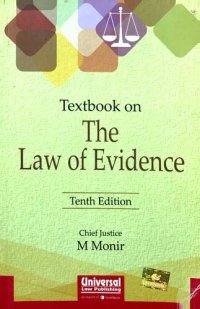
Ebook: Textbook on The Law of Evidence
Author: Chief Justice M Monir
- Publisher: Universal Law Publishing
- Edition: 10 Tenth Edition
- Language: English
- pdf
Function of the law of evidence.-The Law of Evidence may be defined as a system of rules for ascertaining controverted questions of fact in judicial inquiries. It bears the same relation to a judicial investigation as logic to reasoning. The object of every judicial proceeding is the enforcement of some right or liability which invariably depends upon certain facts. The substantive law, whether it be statute law or common law, merely
defines what facts go to constitute a right or liability. Before a tribunal can pronounce as to the existence of a right or liability, it must ascertain the facts which, according to the rule of Substantive Law applicable to the case, are the necessary constituents of that right or liability. This duty of ascertaining the facts which are the essential elements of a right of liability is the primary, and perhaps the most difficult, function of a tribunal. The inquiry into these facts is regulated by a set of rules and principles which go by the name of "Law of Evidence". The first task of a Judge being to ascertain facts, the rules by
which the inquiry before him is regulated should not, in their fundamentals, differ from those by which any other seeker after truth regulates his inquiries. The Physicist who ascertains the properties of matter or the Historian who is concerned with finding what
happened in the past is as much a seeker after truth as the Judge who is concerned with ascertaining whether a man has encroached on his neighbour's land or stolen another
man's watch. Again, in the ordinary affairs of life we are
defines what facts go to constitute a right or liability. Before a tribunal can pronounce as to the existence of a right or liability, it must ascertain the facts which, according to the rule of Substantive Law applicable to the case, are the necessary constituents of that right or liability. This duty of ascertaining the facts which are the essential elements of a right of liability is the primary, and perhaps the most difficult, function of a tribunal. The inquiry into these facts is regulated by a set of rules and principles which go by the name of "Law of Evidence". The first task of a Judge being to ascertain facts, the rules by
which the inquiry before him is regulated should not, in their fundamentals, differ from those by which any other seeker after truth regulates his inquiries. The Physicist who ascertains the properties of matter or the Historian who is concerned with finding what
happened in the past is as much a seeker after truth as the Judge who is concerned with ascertaining whether a man has encroached on his neighbour's land or stolen another
man's watch. Again, in the ordinary affairs of life we are
Download the book Textbook on The Law of Evidence for free or read online
Continue reading on any device:

Last viewed books
Related books
{related-news}
Comments (0)